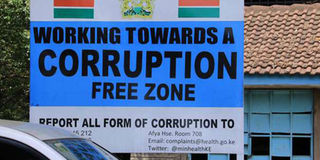Regime change is no panacea to corruption

A sign post outside Afya House on October 28, 2016 bears a message championing for integrity. Corruption is corruption. PHOTO | JEFF ANGOTE | NATION MEDIA GROUP
What you need to know:
- The idea that we can deal with this one ‘type’ of corruption, through some sort of incision, is, to use his phrase, ‘nonsense on stilts’.
- Rather than find excuses or continue with unhelpful rhetoric, let us be honest with ourselves.
Unsurprisingly, recent numerous commentaries on corruption have highlighted the current ‘looting spree’.
We are told it is our worst government ever.
Respected columnist David Ndii is a man on a mission.
He has occupied acres of space to demonstrate just how bad the Jubilee government is.
All this culminated in his latest piece in which he made a case for replacing ‘looting’ Jubilee with ‘anything, anyone’.
In his view, removing Jubilee from power is the panacea to corruption in Kenya. I disagree for two reasons.
First, the argument that petty corruption, grand corruption and looting are different in kind rather than degree is highly misleading.
Corruption is corruption.
This erroneous classification leads him to acquiesce with petty and grand corruption and set his sights on looting as the point at which we must draw the line.
The idea that we can deal with this one ‘type’ of corruption, through some sort of incision, is, to use his phrase, ‘nonsense on stilts’.
We have seen these sorts of arguments before and we know that they will lead us to the same place.
The anti-corruption agenda has revolved around regime change.
BIGGER PICTURE
I grew up at a time when the rallying call was “Moi must go” and “yote yawezekana bila Moi”. Moi went. Corruption grew.
On reforms, we executed many from all corners including creation of an anti-corruption agency and public finance reform.
We even got a new, progressive Constitution. Nothing doing.
We had clearly missed something. We have mischaracterised corruption and I think Ndii is missing the same point.
Our choice of metaphor where we see corruption as a ‘cancer’, has led us to believe that if we were to cut it out, we would heal.
That’s why our efforts, like those I’ve listed above, have been geared to finding a good surgeon for cutting out the ailing parts.
We have tried this before and failed.
Rather than find excuses or continue with unhelpful rhetoric, let us be honest with ourselves.
If we are to stick to epidemiological metaphors, we need to stop thinking of corruption as a ‘cancer’ and instead consider it a ‘hemorrhagic fever’.
The whole body is affected, you cannot cut off a piece of it.
You’ve got to treat the whole. We must set our sights on greater change, not just a game of musical chairs.
Our way out is to get our elite, those we support and those we disagree with, that we are tired.
QUESTIONABLE ARGUMENT
They must know that it’s not, cannot and must not be okay to just steal less than the other guy.
This is why Ndii’s analysis is so disappointing.
Second, his analysis is selective and ahistorical.
His frame of ‘insecure regimes’ excludes the Grand Coalition government, which he would have us believe didn’t ‘loot’.
This is a curious choice especially when one thinks back to how scandalous that government was.
It is recent history. Just thinking about the scandals such as the sale of the Grand Regency Hotel, the Kenyan Embassy in Japan, Kazi Kwa Vijana raises serious questions about the choice of this frame.
But seeing that the ultimate point of his argument is for us to replace this ‘looters’ with the next ones around the block, one starts to understand this choice.
What with not replacing the ‘looters’ with saints. When the foundation is shaky, the house cannot be stable.
Kamau Wairuri is a policy analyst based in Nairobi. [email protected]




